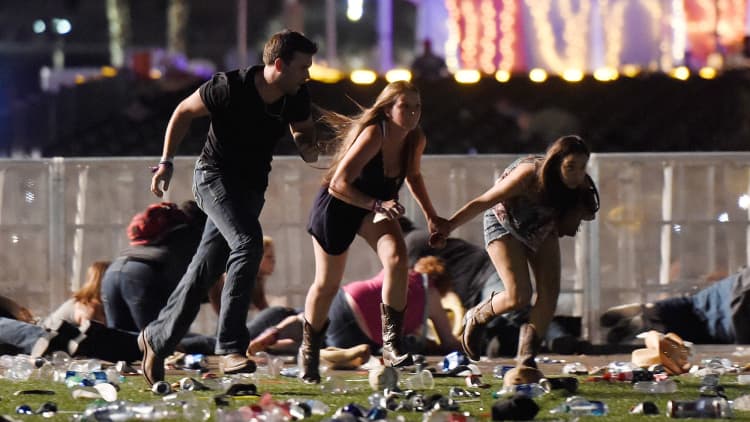Did Las Vegas shooter Stephen Paddock use a smartphone, and if so, will investigators ever unlock its secrets?
As law enforcement officials work to understand what motivated the gunman to kill at least 58 people in Las Vegas, Paddock's technology habits have come into focus.
The suspect apparently acted alone. Because he was found dead in what appears to be a suicide, authorities are scrambling to find clues he may have left behind.
The incident revives questions about the privacy protections built into smartphones. Law enforcement officials want companies like Apple and Google to give them keys to unlock the devices. The companies have so far refused to give authorities a master key that would open every phone.
Chris Swecker, former FBI assistant director, told CNBC that if Paddock had a smartphone, it could be a 'treasure trove' of information about his motives and contacts.
"It is one of the more critical ways to reconstruct the shooter's movements," said Swecker.
Technology companies say there are often ways to gather digital evidence without compromising everyone's privacy. Much of the information that law enforcement officials look for could be stored outside the device, such as with a suspect's phone carriers or in the cloud. If so, companies can access and deliver that information so long as they are provided with appropriate warrants.
For example, Google publishes a Transparency Report in which the search giant details the number of user data requests from government authorities it receives every six months.
However, one potential problem could arise, said Roger Kay of tech research firm Endpoint Technologies: If the shooter carefully covered his tracks using encryption, then accessing information on the device itself could prove nearly impossible.
That issue made headlines last year when the FBI and Apple engaged in a heated court battle regarding one of the iPhones used by the San Bernardino terrorists.
The FBI demanded that Apple bypass the security of that phone. Apple countered that was dangerous because, in order to do so, it would have needed to create a new version of the operating system. The company said there was a real risk that such software could fall into the hands of criminals, thereby putting at risk millions of iPhone users.
In the case of the Las Vegas shooter, Kay said that if there is a device that contains encrypted data — which law enforcement cannot access through other means — then the same complex debate around privacy and security that defined the San Bernardino tragedy could take place again.
WATCH: Police identify Las Vegas shooter as Stephen Paddock




